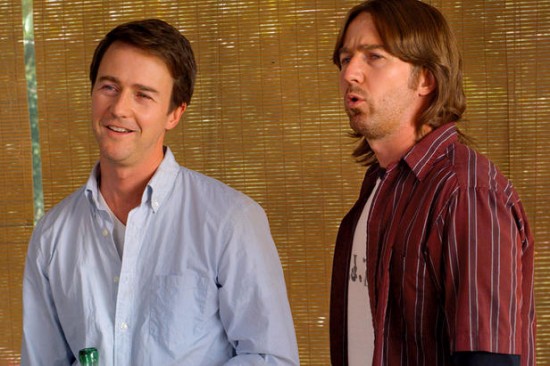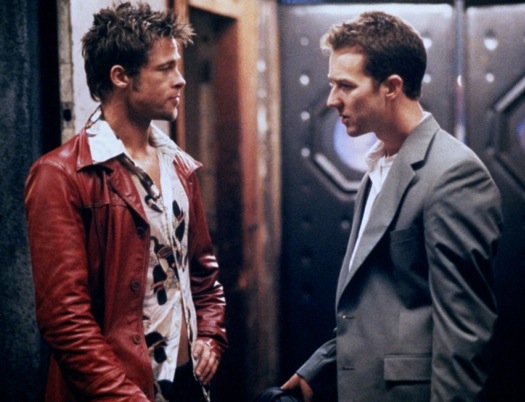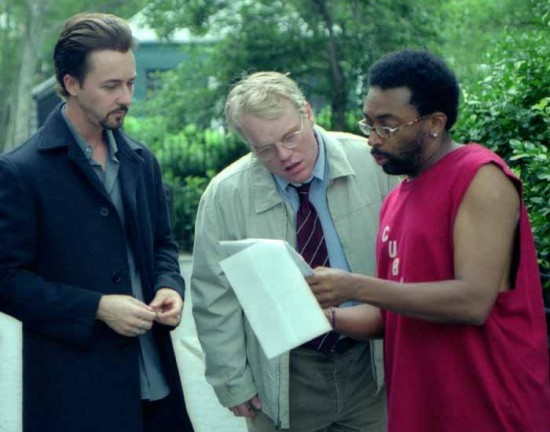Interview: Edward Norton Discusses The Thoughtful Summer Thriller Leaves Of Grass, His Goals As An Actor, And The Legacies Of Fight Club And Spike Lee
Sitting opposite Ed Norton in an empty conference room in a skyrise, one can't avoid thinking about the hyper-charged situations he's glared down on film. Clad in a black shirt and noticeably relaxed, he takes a moment before responding to a question, pressing a small washer-like object into the table and letting it spring back. It allows a brief window to search for the chiseled Nazi skinhead who forced a thug to tooth a curb in American History X. And for the office drone who scaled barbwire fences late at night to steal the excess fat of women and absorbed grueling punches in Fight Club. And for the smack dealer in 25th Hour who walked man's best friend by a World Trade Center-less horizon, as unprepared for a future in the clink as the U.S. was for its uncertain present.
Norton is obsessively drawn to characters whose scariest adversary is in the mirror. It doesn't matter if the playing field is a study in madness or a testy, possibly concluded, stint in the Marvel Universe as Bruce Banner. His latest film, a thoughtful thriller entitled Leaves of Grass, puts a literal spin on his interest in duality. He plays formerly estranged, highly intelligent twins—one a respected and reserved philosophy professor, the other a shaggy distributor of hydroponic marijuana.
Written and directed by his friend and co-star, Tim Blake Nelson, perhaps best known for his role in O Brother, Where Art Thou?, Norton is convincing in both roles. And during scenes of angry confrontation and stoned bonding between the brothers, he excels like few A-list actors today. No surprise really. But Grass—which just secured a wider theatrical release this summer–doesn't offer an arrow to mark the future direction of Norton's career. With Hollywood less and less interested in smart adult fare and serious films that aren't polemics, Norton's emphasis on creative control and integrity can appear at risk of splitting his mainstream profile in two. He discussed his goals as an actor and reflected on his past film choices with /Film.
 Hunter Stephenson: The film was pretty cool. I enjoyed it. To be honest, I didn't know what to expect really, because there seemed to be a bit of a delay with the distribution...Ed Norton: No, I wouldn't say that, because when we finished it, we really said, "We have to take this to South by Southwest." Tim and I have friends in Austin and the film has Steve Earle and music by Townes Van Zandt, and if there's a single town in America that loves pot and philosophy it's Austin. So, we finished filming Leaves of Grass, it was a pretty quick shoot, and sometimes you go, "We're done in July, but the festival we want to bring this to is [months away]." So, we thought, let's take it to Toronto and skip Sundance, and go to Austin. We had so much fun down there and the screening went great. I'm hopeful with this film and want to see it expand beyond New York and Dallas. You always hope people who like these types of films will go and show up, but it's really starting to become a squeeze moment. I'm trying to impress the feeling that, "if you like them, show up and support them." You know?Sure. It's strange to me that an actor playing twins on screen has become something of a novelty. It's been abused, but it's a perfect example of technology enabling art. What did you gain as an actor from playing twins, since you've played several roles dealing with duality, including your debut in Primal Fear?Ed Norton: I see it—it goes back to the ancient symbol of the comedy and tragedy masks. I really think people relate to the idea of a dual nature in themselves; most of us have a relationship with ourselves that's far more complex than how other people think of us. Most people think there's a lot more in them than other people know. To me, it's always been interesting to explore that duality. You know, I think that's what Fight Club was about as well. I think that's why Fight Club tapped such a nerve in people at the time because there was more to them...Than the cubicle life...Ed Norton: Yeah. Yeah. The surfaces of peoples' daily work life, more and more people felt like it didn't represent who they were. People were getting boxed in and defined, and over-managed. I think that twins—Tim's a real classicist. I feel in the movie he's referencing who he is using these twins. He was using these characters to connect to so many ideas he has [about life]. More than anyone this movie is about him. Tim is from Oklahoma and he grew up on [the music of] Little Feat and Townes and all that stuff. And he really did go off to Brown to study classical philosophy. He's taken his own innerlife and split it. The film is an enormous window into Tim's brain.
Hunter Stephenson: The film was pretty cool. I enjoyed it. To be honest, I didn't know what to expect really, because there seemed to be a bit of a delay with the distribution...Ed Norton: No, I wouldn't say that, because when we finished it, we really said, "We have to take this to South by Southwest." Tim and I have friends in Austin and the film has Steve Earle and music by Townes Van Zandt, and if there's a single town in America that loves pot and philosophy it's Austin. So, we finished filming Leaves of Grass, it was a pretty quick shoot, and sometimes you go, "We're done in July, but the festival we want to bring this to is [months away]." So, we thought, let's take it to Toronto and skip Sundance, and go to Austin. We had so much fun down there and the screening went great. I'm hopeful with this film and want to see it expand beyond New York and Dallas. You always hope people who like these types of films will go and show up, but it's really starting to become a squeeze moment. I'm trying to impress the feeling that, "if you like them, show up and support them." You know?Sure. It's strange to me that an actor playing twins on screen has become something of a novelty. It's been abused, but it's a perfect example of technology enabling art. What did you gain as an actor from playing twins, since you've played several roles dealing with duality, including your debut in Primal Fear?Ed Norton: I see it—it goes back to the ancient symbol of the comedy and tragedy masks. I really think people relate to the idea of a dual nature in themselves; most of us have a relationship with ourselves that's far more complex than how other people think of us. Most people think there's a lot more in them than other people know. To me, it's always been interesting to explore that duality. You know, I think that's what Fight Club was about as well. I think that's why Fight Club tapped such a nerve in people at the time because there was more to them...Than the cubicle life...Ed Norton: Yeah. Yeah. The surfaces of peoples' daily work life, more and more people felt like it didn't represent who they were. People were getting boxed in and defined, and over-managed. I think that twins—Tim's a real classicist. I feel in the movie he's referencing who he is using these twins. He was using these characters to connect to so many ideas he has [about life]. More than anyone this movie is about him. Tim is from Oklahoma and he grew up on [the music of] Little Feat and Townes and all that stuff. And he really did go off to Brown to study classical philosophy. He's taken his own innerlife and split it. The film is an enormous window into Tim's brain. Before I saw the film, I didn't know if the title was a direct reference to Walt Whitman's book of poetry. But Whitman is briefly discussed in the film. What's the significance of the book?Ed Norton: I've always loved Whitman, and when I picked up the script, I thought, "Oh, Tim's written something by him." But I think the scene I have in the film with Keri Russell, where she talks about Whitman and how he created poetry by breaking rules and not following the confines of what poetry was back then, in a sense the movie is about a professor and a life unfulfilled. I think Whitman figured out that a certain amount of philosophy is beautiful and important. That's what this film is about. I like the reference.Do you see a comparison between the themes of Leaves of Grass and the Coen Brothers' A Serious Man? Both films have a heavy mixture of Jewish faith and tradition, marijuana, and the search for self amidst chaos...Ed Norton: Tim and Joel [Coen] are friends from way back. And no one has come up from the era we came up in and not been influenced by the Coens. I really liked A Serious Man, but I think Tim's movie is really about finding balance; whereas the Coens, in their films they don't tend to have serious female characters. I mean, Fargo did, but when I compare those two films there's more sentiment in Tim's. There's more authentic romance. I think Tim's film is much more earnest. The Coens' tend to take a subculture and run wild—they make a fun and surreal world out of it.You produced a documentary on President Obama. Do you see a correlation between the exit of the Bush administration and the rise of pot films? Along with Leaves of Grass, there's Your Highness by David Gordon Green, the Duplass Brothers are making one, and Natalie Portman has Nice Buds...Ed Norton: I really think that's more generational than political. Suddenly there's two volcano movies. Who knows why. I guess it might be collective unconscious. I think it's more about this generation growing up and getting their shot and making things. Pot films are part of a weird little cycle. I know you guys are interested in films that get made outside the studio system. I think the financial downturn over the last decade, you know, the credit isn't there anymore. There's been a huge compression recently for films that straddle weird tonal lines.
Before I saw the film, I didn't know if the title was a direct reference to Walt Whitman's book of poetry. But Whitman is briefly discussed in the film. What's the significance of the book?Ed Norton: I've always loved Whitman, and when I picked up the script, I thought, "Oh, Tim's written something by him." But I think the scene I have in the film with Keri Russell, where she talks about Whitman and how he created poetry by breaking rules and not following the confines of what poetry was back then, in a sense the movie is about a professor and a life unfulfilled. I think Whitman figured out that a certain amount of philosophy is beautiful and important. That's what this film is about. I like the reference.Do you see a comparison between the themes of Leaves of Grass and the Coen Brothers' A Serious Man? Both films have a heavy mixture of Jewish faith and tradition, marijuana, and the search for self amidst chaos...Ed Norton: Tim and Joel [Coen] are friends from way back. And no one has come up from the era we came up in and not been influenced by the Coens. I really liked A Serious Man, but I think Tim's movie is really about finding balance; whereas the Coens, in their films they don't tend to have serious female characters. I mean, Fargo did, but when I compare those two films there's more sentiment in Tim's. There's more authentic romance. I think Tim's film is much more earnest. The Coens' tend to take a subculture and run wild—they make a fun and surreal world out of it.You produced a documentary on President Obama. Do you see a correlation between the exit of the Bush administration and the rise of pot films? Along with Leaves of Grass, there's Your Highness by David Gordon Green, the Duplass Brothers are making one, and Natalie Portman has Nice Buds...Ed Norton: I really think that's more generational than political. Suddenly there's two volcano movies. Who knows why. I guess it might be collective unconscious. I think it's more about this generation growing up and getting their shot and making things. Pot films are part of a weird little cycle. I know you guys are interested in films that get made outside the studio system. I think the financial downturn over the last decade, you know, the credit isn't there anymore. There's been a huge compression recently for films that straddle weird tonal lines.
I think even in the quote-unquote indie world, there's been a much more conservative type of film coming out than an authentic indie film. That [change] has been instantaneous, almost. But making films like Leaves of Grass keeps it interesting to me. I feel like the films I'm making are the kind of movies that affected me growing up. It's very easy, if you want to, to plug into films that are engineered for the lowest common denominator, but I just don't think those films stick around. If you know what I mean...
 I agree. But you're one of the few actors who seems willing to put himself on a limb and make films that matter culturally more than financially...Ed Norton: Thanks. I just don't think those films mean anything to anybody; even though a lot of people are exposed to them and they make a lot of money. They don't stick around. A lot of films are more successful financially than Fight Club or American History X, but those films meant more to people and continue to. To me, if I can make a couple of films that, looking back, people say, "Yeah, that's what our generation felt like at that moment. That's a good document," then I'm content.When I saw Fight Club in the theater, I remember it vividly because there was only one, maybe three people, there on opening weekend. It was depressing. And when the buildings went down, I was like, people will catch on. They had to.Ed Norton: Well, the studio didn't know how to market Fight Club. They tried to sell it to people as "guys lighting bombs." But women loved Fight Club, they loved it, and the studio didn't even try to sell it to them. There was a guy who will remain nameless at Fox. David [Fincher] and I were like, people are going to relate to this film the way people related to The Graduate. We were like, this is funny, and this film is about being young and not knowing what the fuck you're doing in life and going off the rails. And I remember the head of marketing at Fox, he said, "Can one single person tell me what the fuck is funny about this movie?" And, Fincher looked at me...it was like what do you do when you have not only this level of misunderstanding, but animosity toward a film?
I agree. But you're one of the few actors who seems willing to put himself on a limb and make films that matter culturally more than financially...Ed Norton: Thanks. I just don't think those films mean anything to anybody; even though a lot of people are exposed to them and they make a lot of money. They don't stick around. A lot of films are more successful financially than Fight Club or American History X, but those films meant more to people and continue to. To me, if I can make a couple of films that, looking back, people say, "Yeah, that's what our generation felt like at that moment. That's a good document," then I'm content.When I saw Fight Club in the theater, I remember it vividly because there was only one, maybe three people, there on opening weekend. It was depressing. And when the buildings went down, I was like, people will catch on. They had to.Ed Norton: Well, the studio didn't know how to market Fight Club. They tried to sell it to people as "guys lighting bombs." But women loved Fight Club, they loved it, and the studio didn't even try to sell it to them. There was a guy who will remain nameless at Fox. David [Fincher] and I were like, people are going to relate to this film the way people related to The Graduate. We were like, this is funny, and this film is about being young and not knowing what the fuck you're doing in life and going off the rails. And I remember the head of marketing at Fox, he said, "Can one single person tell me what the fuck is funny about this movie?" And, Fincher looked at me...it was like what do you do when you have not only this level of misunderstanding, but animosity toward a film?
And like you said, I think ultimately people forget how poorly Fight Club did, but that's one of the films of our generation. And for us at the time, it was disappointing, because The Matrix had just come out, and we were like there's this sensibility—maybe it will catch this wave. But there were so many of us that that year, that year was: The Matrix, Election, Fight Club, Being John Malkovich, Three Kings, and Magnolia, that was all of us. And The Matrix was the only film that did well commercially. I remember seeing Magnolia, and thinking "This is one of my favorite films," and it didn't do well at all. But it was like, who cares? Really? If the studio doesn't know how to sell it, that's their problem.
 Going back to your interest in films that reflect our generation, The 25th Hour was slept on originally as well, but it ended up being included on numerous top 10 lists for the decade. In my opinion, it's probably the only film that deals with post 9/11 life and isn't grating...Ed Norton: To me, the reason why that movie was so exciting to make—Spike is so committed. No other director deals more with the moment and deals with what is going on in our culture more than Spike Lee. He takes dead aim at it. And after September 11th, Spike just said we're doing this right now—RIGHT NOW!—and dealing with the melancholy, the sense of loss. He investigates the times we live in, and it's fascinating to me. I don't know how old you are, but I came up on his films. Do the Right Thing, Jungle Fever, and Malcolm X... Yeah. I had a Malcolm X bookmark in fourth or fifth grade...Ed Norton: So, I'm a little older than you, because I was a freshman in college when Do the Right Thing came out, and that movie was like a...grenade. Nobody was saying that stuff. In 1989, Do the Right Thing was a radical statement—well, it was more like a question to everyone. I was 18, and I was getting much more serious about movies at the time. It made such an impact on me. I heard Garry Trudeau give a talk one time—the Doonesbury guy—and he basically says, "Go out and ask impertinent questions." I feel like that describes a lot about Spike. He goes out and he doesn't make a movie that makes you feel comfortable. He goes out and asks, "Martin, Malcolm. What do you do with that?"
Going back to your interest in films that reflect our generation, The 25th Hour was slept on originally as well, but it ended up being included on numerous top 10 lists for the decade. In my opinion, it's probably the only film that deals with post 9/11 life and isn't grating...Ed Norton: To me, the reason why that movie was so exciting to make—Spike is so committed. No other director deals more with the moment and deals with what is going on in our culture more than Spike Lee. He takes dead aim at it. And after September 11th, Spike just said we're doing this right now—RIGHT NOW!—and dealing with the melancholy, the sense of loss. He investigates the times we live in, and it's fascinating to me. I don't know how old you are, but I came up on his films. Do the Right Thing, Jungle Fever, and Malcolm X... Yeah. I had a Malcolm X bookmark in fourth or fifth grade...Ed Norton: So, I'm a little older than you, because I was a freshman in college when Do the Right Thing came out, and that movie was like a...grenade. Nobody was saying that stuff. In 1989, Do the Right Thing was a radical statement—well, it was more like a question to everyone. I was 18, and I was getting much more serious about movies at the time. It made such an impact on me. I heard Garry Trudeau give a talk one time—the Doonesbury guy—and he basically says, "Go out and ask impertinent questions." I feel like that describes a lot about Spike. He goes out and he doesn't make a movie that makes you feel comfortable. He goes out and asks, "Martin, Malcolm. What do you do with that?"
And I flat out gravitate towards that; what Fincher did with Fight Club was the same. There is never going to be a voice-over at the end of Fincher's or Spike's movies, saying like, "I died, but in the end everything is going to be okay and you don't have to worry." I don't think audiences want to be lead by the nose like that. Some movies may encourage them to think that way. But I don't believe they want to.
Hunter Stephenson can be followed on Twitter and reached at h.attila/gmail.
